The recent criminal allegations against Apple have revealed a troubling reality regarding the origin of certain materials used in the famous iPhones. The Democratic Republic of the Congo alleges that the company contributes to an immoral trade by sourcing blood minerals, extracted through deplorable methods. This notice raises important questions about the responsibility of large tech companies in the face of human exploitation practices and reveals the dark side of modern technology.
The Democratic Republic of the Congo has filed criminal complaints against Apple in France and Belgium, accusing it of using blood minerals in the manufacturing of its devices, notably the iPhone. These minerals, such as tin and tantalum, are extracted through forced labor and child labor in mines controlled by armed groups. The allegations highlight a link between Apple’s supply chain and atrocities committed in the region, underscoring the complexity and severity of human rights violations in the tech sector. Despite Apple’s commitments to responsible sourcing, the DRC maintains that the company profits from this exploitation, integrating a major ethical issue into the debate on technological consumption.

The Democratic Republic of the Congo (DRC) recently filed criminal charges against Apple, claiming that the tech giant finances a trade of horrors by using minerals extracted under inhumane conditions. This situation refers to the use of so-called conflict minerals, often referred to as blood minerals, which include tin, tantalum, and tungsten. The allegations indicate that these resources come from mines controlled by armed groups, thus exploiting child labor and forced labor.
Table of Contents
ToggleThe implications of the allegations on the supply chain
The allegations made by the DRC highlight a troubling reality: Apple’s supply chain could be tainted by severe exploitation practices. While many tech companies strive to source ethically, users often remain unaware of the origins of the materials used in their devices. Apple, like others, must navigate a complex system where the true source of minerals is often obscured by mineral laundering initiatives and other deceptive practices.
Towards a collective responsibility
The DRC demands better transparency and an industrial commitment to put an end to this destructive trade. The case highlights the need for collaboration among companies, governments, and NGOs to ensure that supply chains are free from human rights violations. Legal actions could spur changes in the tech industry, pushing giants like Apple to adopt more responsible practices while ensuring a more sustainable future for those affected by these conflicts.











